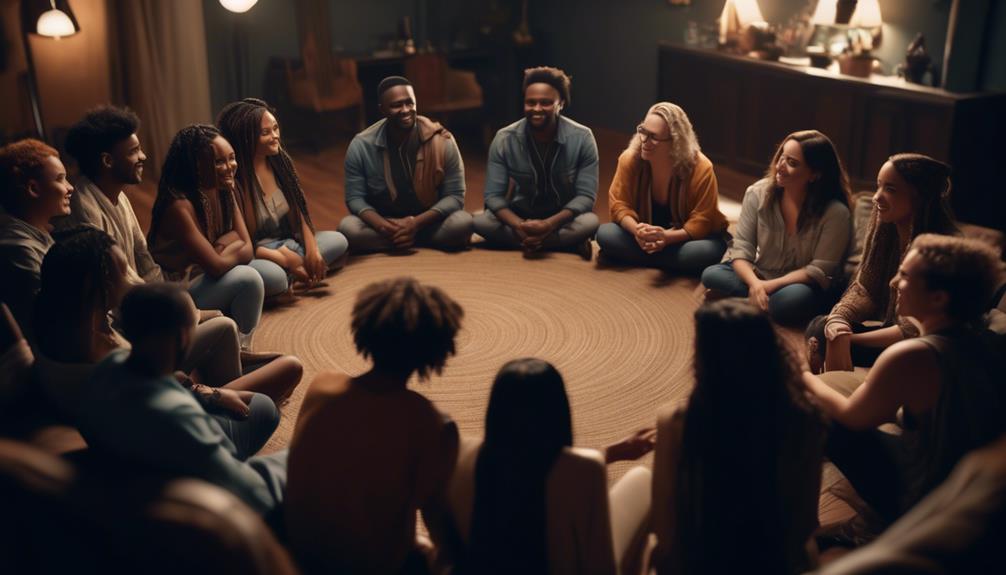How to Embrace and Celebrate Differences in Diverse Friendship Circles

Tips for Embracing and Celebrating Differences in Diverse Friendship Circles:
- Importance of diversity: Recognize and appreciate the value that diversity brings to your friendship circle. Understand that diverse perspectives and experiences enrich your relationships.
- Open mindset: Approach friendships with an open mind and be willing to learn from others. Embrace new ideas, beliefs, and perspectives without judgment.
- Active listening: Practice active listening to truly understand and appreciate the experiences and opinions of your friends. Give them space to express themselves and validate their feelings.
- Challenging bias: Be aware of your own biases and work on challenging them. Engage in self-reflection and educate yourself on issues related to diversity and inclusion.
- Embracing traditions: Respect and embrace the traditions and cultural practices of your friends. Participate in their celebrations and learn about their customs.
- Meaningful conversations: Engage in conversations that go beyond surface-level discussions. Share your thoughts, experiences, and opinions openly and respectfully. Encourage your friends to do the same.
- Finding common ground: Look for shared interests and experiences that can create a sense of unity within your diverse friendship circle. Find activities or hobbies that you can enjoy together.
- Celebrating individuality: Recognize and celebrate the unique qualities and talents of each friend. Encourage them to express their individuality and support them in their personal journeys.
Key Takeaways
- Recognize and appreciate the value of diversity in your friendship circle.
- Practice active listening and empathy to understand and appreciate the experiences and perspectives of your friends.
- Challenge and reflect on your own biases to foster a more open-minded and inclusive friendship circle.
- Embrace and celebrate the traditions, customs, and unique qualities of each friend in your diverse friendship circle.
Understanding the Importance of Diversity
Understanding the importance of diversity in friendship circles is crucial for fostering a rich and dynamic social environment. Promoting inclusivity and fostering understanding are key factors that contribute to the thriving of such circles. When we surround ourselves with people from different backgrounds, cultures, and perspectives, we open ourselves up to new ideas, experiences, and ways of thinking. This diversity allows us to challenge our own beliefs and expand our horizons.
Inclusive friendship circles create a space where everyone feels valued and respected. By embracing diversity, we create opportunities for individuals to share their unique experiences and perspectives, fostering a sense of belonging and acceptance. This inclusivity also breaks down barriers and stereotypes, promoting understanding and empathy among friends.
Diverse friendship circles are a breeding ground for innovation. When people from various backgrounds come together, they bring their different skills, knowledge, and experiences, creating a melting pot of ideas. This diversity of thought fuels creativity and problem-solving, leading to breakthroughs and advancements.
Cultivating an Open Mindset
To cultivate an open mindset, it's important to embrace diverse perspectives and actively seek out new ideas and experiences. Developing tolerance and fostering inclusivity are key components of this process. By being open to different viewpoints, you create opportunities for personal growth and innovation.
One way to cultivate an open mindset is to engage in meaningful conversations with people from different backgrounds. This allows you to gain insights into their unique experiences and challenges. Actively listening to their perspectives without judgment is crucial. It helps broaden your understanding of the world and challenges your own beliefs and assumptions.
In addition to conversations, seeking out new experiences is essential. Step out of your comfort zone and actively engage in activities or events that expose you to different cultures, traditions, or ways of thinking. This can include attending cultural festivals, trying new cuisines, or even traveling to different countries.
Active Listening and Empathy
Active listening and empathy are essential skills for fostering meaningful connections and understanding others' perspectives. When engaging in active listening, you're fully present in the conversation, giving your undivided attention to the speaker. This means putting away distractions, such as your phone or other electronic devices, and focusing on the person in front of you. Active listening involves not just hearing the words being spoken, but also paying attention to non-verbal cues, such as body language and tone of voice. By doing so, you can better understand the speaker's emotions and intentions.
Empathy, on the other hand, is the ability to understand and share the feelings of another person. It goes beyond sympathy, which is merely feeling sorry for someone. Empathy requires putting yourself in someone else's shoes and seeing the world from their perspective. It involves being sensitive to their emotions, validating their experiences, and showing genuine care and concern.
Recognizing and Challenging Bias
Recognizing and challenging bias is an important step in embracing differences in friendship circles.
By identifying unconscious biases, you can become more aware of any preconceived notions or stereotypes that may influence your interactions with others.
Promoting open-mindedness and actively challenging these biases can lead to more inclusive and meaningful friendships.
Identifying Unconscious Biases
Unconscious biases can often influence our perceptions and judgments without us even realizing it. Understanding implicit prejudices is the first step towards promoting inclusivity in our diverse friendship circles.
These biases are deeply ingrained in our subconscious and can affect our behavior and decision-making without us being aware of it. They can lead us to make unfair assumptions about others based on their race, gender, age, or other characteristics.
To identify these biases, it's important to self-reflect and examine our thoughts and actions. We can also engage in open conversations with friends and colleagues, seeking their perspectives and experiences.
Challenging these biases requires us to be open-minded, willing to learn, and actively work towards creating an environment that celebrates and embraces our differences.
Promoting Open-Mindedness
To foster a more inclusive and open-minded friendship circle, it's crucial to actively examine and challenge our inherent biases. Promoting inclusivity and fostering mutual respect requires us to recognize and confront our biases head-on.
Start by acknowledging that everyone has biases, as they're a product of our upbringing, experiences, and societal influences. It's important to approach this process with an open mind and a willingness to learn and grow.
Take the time to reflect on your own biases and prejudices, and consider how they may impact your interactions with others. Engage in conversations and activities that expose you to different perspectives and cultures.
Overcoming Stereotypes
In order to foster a more inclusive and open-minded friendship circle, it's important to challenge and overcome the stereotypes and biases that may hinder our relationships with others.
Challenging assumptions is a crucial step towards promoting inclusivity. Stereotypes are often based on generalizations and can lead to unfair judgments and misunderstandings.
To overcome these biases, it's essential to approach each individual with an open mind, free from preconceived notions. By actively seeking to understand and appreciate the unique qualities of others, we can break down barriers and build stronger, more authentic connections.
It's also important to educate ourselves and engage in meaningful conversations about diversity and inclusion. By doing so, we can create an environment where everyone feels valued and respected, regardless of their background or differences.
Embracing Cultural Traditions and Customs
When it comes to embracing cultural traditions and customs, there are several aspects to consider.
Cultural festivals and events provide an opportunity to learn and appreciate different traditions, while food and cuisine allow for a taste of diverse cultures.
Additionally, language and communication play a vital role in understanding and connecting with people from different backgrounds.
Embracing these aspects can foster understanding, respect, and inclusivity in friendship circles.
Cultural Festivals and Events
Cultural festivals and events provide an opportunity for individuals to embrace and celebrate the diverse traditions and customs of different cultures. These events often showcase various cultural performances, such as music, dance, and theater, allowing people to experience and appreciate the richness of different artistic expressions.
Attending these festivals can also foster intercultural relationships, as people from different backgrounds come together to celebrate and learn from one another. By participating in these events, individuals can broaden their perspectives, gain a deeper understanding of other cultures, and develop a sense of empathy and respect for diversity.
Cultural festivals and events not only serve as a platform for cultural exchange and mutual learning but also contribute to the promotion of inclusivity, unity, and global harmony.
Food and Cuisine
Attending cultural festivals and events not only provides an opportunity to embrace and celebrate the diverse traditions and customs of different cultures, but it also offers a chance to explore and appreciate the unique flavors and culinary delights that form an integral part of these cultural traditions. Food and cuisine play a significant role in showcasing a culture's history, values, and identity. Through culinary exploration, you can discover the art of fusion cuisine, where traditional recipes are combined with modern techniques and ingredients to create innovative and delicious dishes. Whether it's savoring the comforting flavors of Indian curry, indulging in the delicate flavors of Japanese sushi, or experiencing the fiery spices of Mexican cuisine, food brings people together and allows us to appreciate the richness of cultural diversity. Expand your palate and embrace the world through the universal language of food.
| Cuisine | Country of Origin |
|---|---|
| Sushi | Japan |
| Curry | India |
| Tacos | Mexico |
Language and Communication
To fully embrace the diverse traditions and customs of different cultures, it's important to recognize the significance of language and communication. Language is more than just a means of communication; it's a reflection of a culture's values, beliefs, and history.
When interacting with individuals from different cultures, it's crucial to be mindful of language barriers that may exist. These barriers can hinder effective communication and understanding.
However, communication isn't solely limited to verbal language. Non-verbal communication, such as body language and gestures, also plays a significant role in cross-cultural interactions.
By being attentive to both verbal and non-verbal cues, we can better understand and connect with individuals from diverse backgrounds.
Embracing different languages and communication styles can foster innovation and create richer and more inclusive friendship circles.
Engaging in Meaningful Conversations
Engaging in meaningful conversations allows for deeper connections and understanding within friendship circles. Meaningful conversations are not just about small talk or exchanging pleasantries; they involve delving into topics that matter, sharing thoughts and perspectives, and actively listening to one another. These conversations foster connections by creating a safe and inclusive space for individuals to express themselves authentically.
To illustrate the importance of meaningful conversations, let's take a look at the following table:
| Benefits of Meaningful Conversations | Examples |
|---|---|
| 1. Enhances empathy and understanding | Sharing personal experiences and perspectives |
| 2. Promotes mutual respect and acceptance | Acknowledging and valuing different opinions |
| 3. Sparks creativity and innovation | Brainstorming ideas and challenging assumptions |
| 4. Strengthens bonds and trust | Discussing shared goals and aspirations |
Finding Common Ground
Finding common ground is essential for building strong and inclusive friendship circles. It allows individuals from diverse backgrounds to connect and bridge their differences.
When looking for common ground with your friends, consider the following techniques:
- Active listening: Be present and genuinely listen to others. This not only shows respect but also helps you understand their perspectives and experiences.
- Shared interests: Discover activities or hobbies that you both enjoy. Whether it's a love for hiking, cooking, or art, shared interests provide a foundation for building connections and creating meaningful experiences together.
- Open-mindedness: Embrace different viewpoints and be willing to explore alternative perspectives. This openness fosters understanding and encourages healthy discussions.
- Mutual respect: Treat each other with kindness and respect, regardless of your differences. Recognize and appreciate the unique qualities and experiences that each person brings to the friendship.
Celebrating Individuality and Uniqueness
Embracing the unique qualities and individuality of each person in your friendship circle is key to fostering a diverse and inclusive environment. Celebrating differences and appreciating diversity not only enriches your relationships but also promotes innovation and personal growth. By valuing and acknowledging the distinct perspectives, talents, and experiences that each individual brings to the table, you create an atmosphere where everyone feels valued and empowered.
To truly celebrate individuality and uniqueness, it is important to go beyond mere tolerance and actively seek to understand and learn from one another. Encourage open and respectful conversations where everyone has the opportunity to share their thoughts and experiences. Embrace the opportunity to engage with different cultures, backgrounds, and perspectives, as this will broaden your horizons and challenge your own preconceived notions.
To further illustrate the importance of celebrating individuality and uniqueness, let's take a look at the following table:
| Individuality | Uniqueness | Impact |
|---|---|---|
| Diverse interests and hobbies | Unique perspectives | Sparks creativity and innovation |
| Varied cultural backgrounds | Special talents and skills | Encourages personal growth |
| Different personality traits | Distinct life experiences | Fosters empathy and understanding |
| Unique identities | Various ways of thinking | Enhances problem-solving abilities |
Frequently Asked Questions
How Can I Effectively Communicate With Someone From a Different Cultural Background?
To effectively communicate with someone from a different cultural background, practice cross cultural communication techniques. Building empathy in intercultural relationships is key. Understand and respect their customs, beliefs, and values. Be open-minded, curious, and willing to learn.
What Are Some Strategies for Challenging and Overcoming My Own Biases?
To challenge and overcome your biases, try these strategies: 1) Recognize and acknowledge your biases. 2) Educate yourself about different cultures and perspectives. 3) Engage in open and respectful conversations with diverse individuals. 4) Embrace empathy and actively listen to others' experiences.
How Can I Respectfully Engage in Conversations About Sensitive Topics With Friends Who Have Different Opinions or Beliefs?
Maintain an open mind when discussing sensitive topics with friends who hold different beliefs. Build empathy by actively listening and seeking to understand their perspective. This fosters a respectful and inclusive conversation.
What Are Some Ways to Celebrate and Honor Cultural Traditions and Customs Within a Diverse Friendship Circle?
You can embrace and celebrate differences in diverse friendship circles by finding ways to incorporate diverse food and exploring different holiday traditions. It's a beautiful tapestry of cultures coming together.
To navigate potential conflicts in diverse friendships, focus on conflict resolution and building empathy. Address differences in values, beliefs, or backgrounds with open-mindedness and respect. Embrace the opportunity to learn and grow from each other's perspectives.











